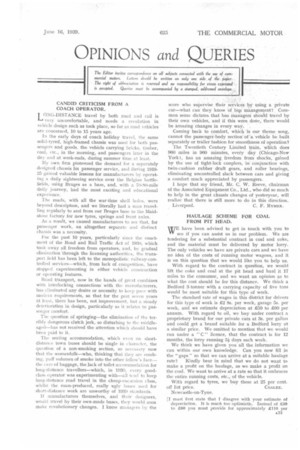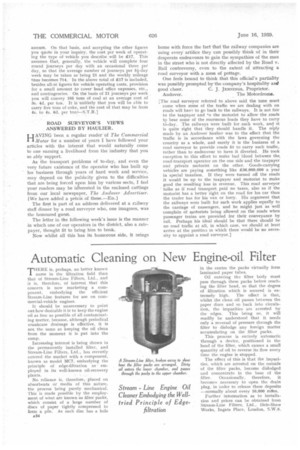OPINIONS and QUERIES The Editor invites correspondence on all subjects
Page 51

Page 52

If you've noticed an error in this article please click here to report it so we can fix it.
connected with the use of commercial motors. Letters should be written on only one side of the paper. The right of abbreviation is reserved and no responsibility for views expresser!
is .accepted. Queries must be accompanied by a stamped, addressed envelope.
CANDID CRITICISM FROM A COACH OPERATOR.
LONG-DISTANCE travel by both road and rail is very uncomfortable, and needs a revolution in vehicle design such as took place, so far as road vehicles are concerned, 10 to 15 years ago.
rn the early days of coach holiday travel, the same solid-tyred, high-framed chassis was used for both passengers and goods. the vehicle carrying bricks. timber, coal, etc., in the morning, and passengers later in the day and at week-ends, during summer time at least.
Mv own firm pioneered the demand for a separately designed chassis for passenger service, and during 191925 gained valuable lessons for manufacturers by operating a daily sightseeing service over the Belgian battlefields, using Bruges as a base, and, with a 70-SO-mile daily journey, had the most exciting and educational experience.
The roads, with all the war-time shell holes, were beyond description, and we literally had a man travelling regularly to and from our Bruges base to the Maidstone factory for new tyres, springs and front axles.
As a result, we caused manufacturers to see that, for passenger work, an altogether separate and distinct chassis was a necessity.
For the past 10 years, particularly since the enactment of the Road and Rail Traffic Act of 19:90, which took away all freedom from operators, and, by gradual elimination 'through the licensing authorities, the transport field has been left to the monopolistic railway-controlled services—which, from lack of competition, have stopped experimenting in either vehicle construction or operating features.
Road transport, now in the hands of great combines with interloCking connections with the manufacturers, has eliminated any desire or necessity to keep pace with modern requirements, so that for the past seven years at least, there has been, not improvement, but a steady deterioration in design, particularly as it relates to passenger comfort.
The question of springing—the elimination of the terribly dangerous clutch jerk, so disturbing to the middleaged—has not received the attention which should have been paid to it.
The seating accommodation, which even on shortdistance town buses should be single in character, the question of a non-smoking section, so necessary DOW that the womenfolk—who, thinking that they are smoking, puff volumes of smoke into the other fellow's face— the care of baggage, the Jack of toilet accommodation for long-distance travellers—which, in 1930, every goodclass operator was experimenting with—all tend to keep long-distance road travel in the cheap-excursion class, whilst the mass-produced, really ugly buses used for short-distance work are unworthy of 1939 standards.
If manufacturers themselves, and their designers, would travel by their own-made buses, they would soon make revolutionary changes. I know managers by the score who supervise, their ser■ ices by using a private car—what can they know of bu,s management? Common sense dictates that bus managers should travel by their own vehicles, and if this were done, there would be amazing changes in every way. ,
Coming back to comfort, which is our thane. song, cannot the passenger-body section of-a vehicle be built separately or trailer fashion for smoothness of operation?
The Twentieth Century Limited train, 'which does 960 miles in 960 minutes, evety day (Chicago-New York), has an amazing freedom from shocks, gained by the use of tight-lock couplers, in conjunction with twin-cushion rubber draft gears, and roller bearings, eliminating uncontrolled slack between cars and giving a comfort much appreciated by passengers.
I hope that my friend, Mr. C. W. Reeve, chairman of the Associated Equipment Co., Ltd., who did so much to help in the great chassis changes of yesteryear, will realize that there is still more to do in this direction.
Liverpool. C. F. RYMER.
HAULAGE SCHEME FOR COAL FROM PIT HEAD.
WE have been advised to get in touch with you to " see if you can assist us in our problem. We are tendering for a substantial contract in coal and coke, and the material must be delivered by motor lorry. The only vehicles we have are private cars and we have no idea of the costs of running motor wagons, and it is on this question that we would like you to help us.
With regard to the contract in question, we would lift the coke and coal at the pit head and haul it 17 miles to the consumer, and we want an opinion as to what the cost should be for this distance. We think a Bedford 3-tonner with a carrying capacity of five tons would be most suitable for this type of work.
The standard rate of wages in this district for drivers for this type of work is £2 &s. per week, garage 5s. per week, and we estimate depreciation at £50 to £60 per annum. With regard to oil, we buy under contract a proprietary brand for our private cars at 3s. per gallon and could get a brand suitable for a Bedford lorry at a similar price. We omitted to mention: that we would run under a " C " licence, that the contract is for 12 months, the lorry running 5k days each week.
We think we have given you all the information we can within our own knowledge. Can you now fill in the "gaps" so that we can arrive at a suitable haulage rate? Kindly bear in mind that we do not want to make a profit on the haulage, as we make a profit on the coal. We want to arrive at a rate so that it embraces the entire running costs, etc., of the vehicle.
With regard to tyres, we buy these at 25 per cent.
off list price. COALEE. Newcastle-on-Tyne.
[I must first state that I disagree with your estimate of depreciation. It is much too optimistic. Instead of ESO to 460 you must provide for approximately £110 per
annum. On that basis, and accepting the other figures you quote in your inquiry, the cost per week of operating the type of vehicle you describe will be £17. This assumes that, generally, the vehicle will complete four round journeys per day with an occasional three per day, so that the average number of journeys per 5i-day week may be taken as being 21 and the weekly mileage thus becomes 714. In the above total of £17 is included, besides all-in figures for vehicle operating costs, provision for a small amount to cover head office expenses, etc., and contingencies. On the basis of 21 journeys per week you will convey 105 tons of coal at an average cost of 3s. 4d. per ton. It is unlikely that you will be able to carry five tons of coke, and the cost of that may be from 4s. to 4s. 6d. per ton!—S.T.R.]
ROAD SURVEYOR'S VIEWS ANSWERED BY HAULIER.
AVING been a regular reader of The Commercial Motor for a number of years I have followed your articles with the interest that would naturally come to one earning a livelihood from the industry that you so ably support.
As the transport problems of to-day, and even the very future existence of the operator who has built up his business through years of hard work and service, may depend on the publicity given to the difficulties that are being forced upon him by various sects, I feel your readers may be iriterested in the enclosed cuttings from our local newspaper, The Andover Advertiser. We have added a precis of these,—En.]
The first is part of an address delivered at a railway staff dinner by a road surveyor who, one imagines, was the honoured guest.
The letter in the following week's issue is the manner in which one of our operators in the district, also a ratepayer, thought fit to bring him to book.
Now whilst all this has its humorous side, it orings home with force the fact that the railway companies are using every artifice they can possibly think of in their desperate endeavours to gain the sympathies of the man in the street who is not directly affected by the Road v. Rail controversy, even to the extent of attracting a road surveyor with a mess of pottage.
One feels bound to think that this official's partiality was possibly prompted by'the company's hospitality and
good cheer. C. J. JENNINGs, Proprietor.
Andover. The Motordrome.
[The road surveyor referred to above said the time must come when some of the traffic we are dealing with on roads will have to go back to the railways. It is not fair to the taxpayer and 'o the motorist to allow the roads to bear some of the enormous loads they have to carry to-day. The railways were built for such work, and it is quite right that they should handle it. The reply made by an Andover haulier was to the effect that the traffic is in accordance with the laws governing the country as a whole, and surely it is the business of a road surveyor to provide roads fit to carry such traffic, rather than to endeavour to have it diverted. He took exception to this effort to make bad blood between the, road-transport operator on the one side and the taxpayer and private motorist on the other. Goods-carrying vehicles are paying something like £36,000,000 a year in special taxation. If they were turned off the roads it would be up to the taxpayer and motorist to make good the resulting loss in revenue. This road surveyor talks as if road transport, paid no taxes, also as if the motorist has a better right on the road for his car than the trader has for his van or lorry. His argument that the railways were built for such work applies equally to the carriage of passengers, and he might just as well complain of motorists being allowed on the roads when passenger trains are provided for their conveyance by rail. Perhaps his ideal should be that there should be no road traffic at all, in which case, we should at least arrive at the position in which there would be no necessity to appoint a road surveyor.]




















































































